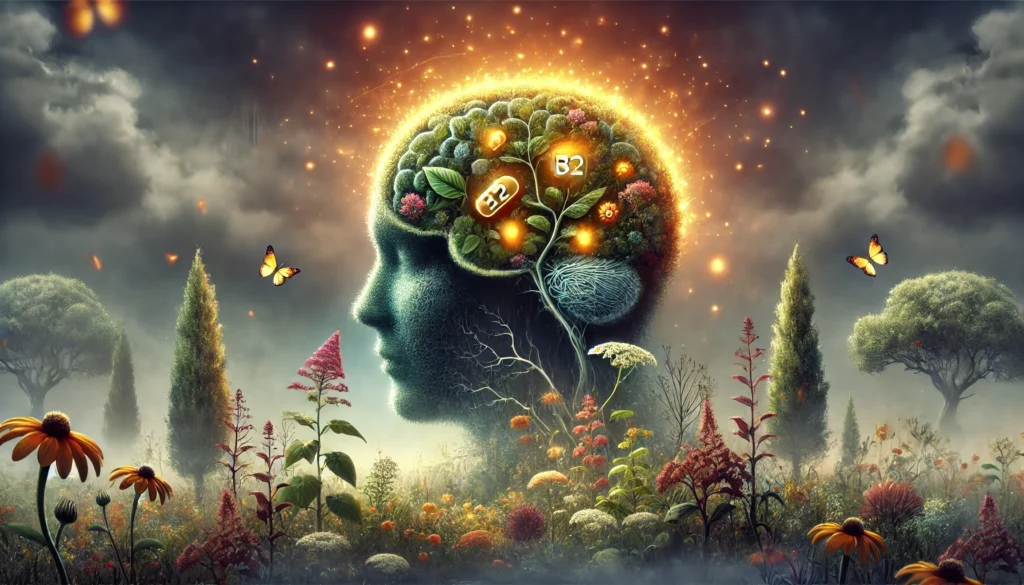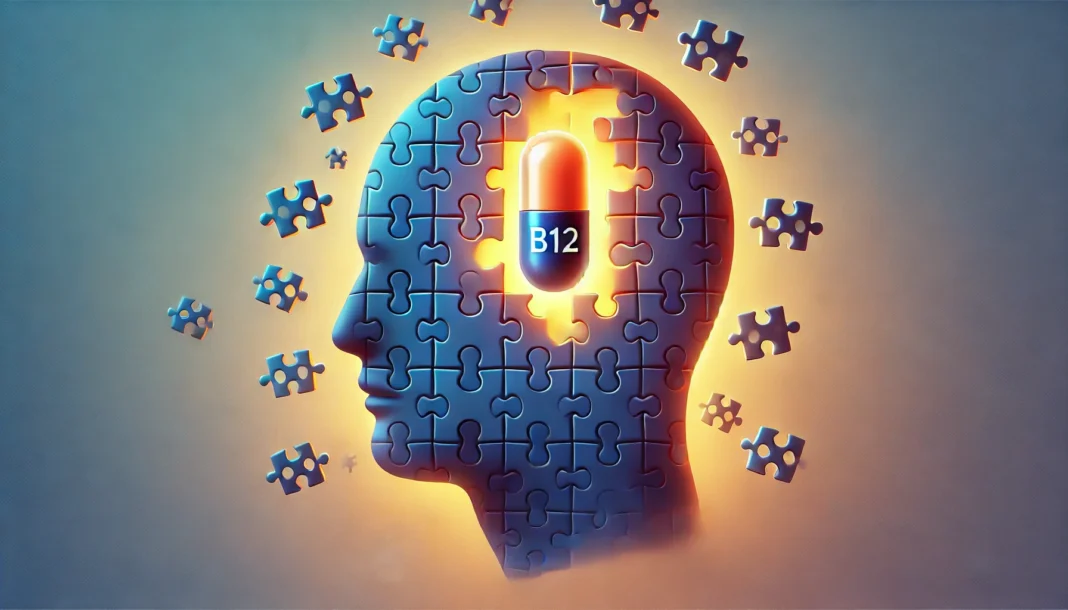Introduction: Exploring the Intersection of Nutrients and Mental Health
In today’s fast-paced world, where stress and mental health challenges are becoming increasingly common, the conversation around nutrition and its role in emotional well-being is gaining prominence. While many people understand the significance of vitamins for physical health, fewer recognize how certain deficiencies may influence psychological states. Among these, the potential link between vitamin B12 and anxiety has attracted both scientific and public interest. Questions such as “Can vitamin B12 cause anxiety?” or “Does vitamin B complex cause anxiety?” are being asked more frequently as individuals seek to optimize their health holistically.
You may also like: Best Herbal Alternatives to Anxiolytics: Natural Remedies for Anxiety Relief
This article delves into the nuanced relationship between B vitamins—particularly vitamin B12—and mental wellness, with a focus on anxiety-related symptoms. By examining current research, understanding how B vitamin deficiency anxiety can manifest, and exploring how supplementation might help or hinder mental health, we aim to provide a thorough, evidence-based guide suitable for health-conscious readers and wellness professionals alike. Through this lens, we will investigate the complex biological and psychological implications of B12 deficiency, discuss the risks of over-supplementation, and provide practical strategies for supporting emotional resilience through nutritional balance.

The Biological Role of Vitamin B12 and the B Complex in Mental Function
Vitamin B12, also known as cobalamin, plays a critical role in numerous bodily processes essential for mental and neurological health. As a water-soluble vitamin, it contributes to the synthesis of DNA, supports the normal function of nerve cells, and is indispensable in the production of red blood cells. Most notably for the context of this discussion, B12 is intricately involved in the metabolism of homocysteine—an amino acid linked to mood disorders when elevated—and the production of neurotransmitters such as serotonin and dopamine, which regulate mood and emotional stability.
The broader B vitamin family, commonly referred to as the B complex, includes thiamine (B1), riboflavin (B2), niacin (B3), pantothenic acid (B5), pyridoxine (B6), biotin (B7), folate (B9), and B12. Together, these vitamins support energy metabolism and neurological function. A deficiency in one or more B vitamins can disrupt brain chemistry, potentially contributing to symptoms like irritability, fatigue, brain fog, and, notably, anxiety. As such, questions like “Does B complex cause anxiety?” or “Can B vitamins make you anxious?” deserve careful analysis within the context of biochemical individuality, dosage, and absorption capacity.

The Science Behind B12 Deficiency and Anxiety Symptoms
Understanding the link between B12 deficiency and anxiety requires a closer look at the mechanisms through which this essential vitamin influences mental function. B12 is necessary for the maintenance of the myelin sheath, a protective covering around nerves that ensures efficient signal transmission in the brain and spinal cord. Without adequate B12, the nervous system becomes vulnerable to misfiring signals, which may contribute to symptoms such as restlessness, panic attacks, or heightened stress responses—common signs associated with b12 anxiety disorder.
Additionally, B12 deficiency often results in elevated homocysteine levels, which are associated with cognitive decline, poor mood regulation, and an increased risk of mental health disorders. High homocysteine can impair cerebral blood flow and induce inflammation in the brain, potentially exacerbating emotional instability. This neurochemical imbalance may help explain why individuals frequently ask, “Can vitamin B12 make you anxious?” or “Does vitamin b12 cause anxiety in the absence of other medical issues?”
Emerging research also suggests that chronic B12 deficiency can alter the brain’s monoamine levels—particularly serotonin, norepinephrine, and dopamine. These neurotransmitters are fundamental to emotional resilience and anxiety regulation. Disruptions in their synthesis or function due to nutrient insufficiency may amplify vulnerability to stress and trigger mood disturbances. For individuals who suffer from unexplained anxiety, investigating whether a b12 deficiency might be the hidden culprit is often a valuable starting point.
It’s also important to highlight the role of gut health in B12 absorption. Conditions like gastritis, atrophic stomach lining, or the use of certain medications (such as proton pump inhibitors or metformin) can impair B12 uptake, making anxiety symptoms harder to resolve without addressing the root absorption issue. This raises further questions such as “Can B12 cause anxiety if it’s not being absorbed properly?” or “Can B vitamins cause anxiety in people with gastrointestinal disorders?” The answer often lies in systemic context and holistic health evaluation.
Frequently Asked Questions (FAQ): Vitamin B12, B Complex, and Anxiety
What are some early signs that vitamin B12 might be influencing my anxiety levels?
Some of the early indicators that B12 might be impacting your anxiety include unexplained nervousness, increased irritability, difficulty concentrating, and physical sensations like tingling in the hands and feet. If you’ve recently changed your diet or started a supplement regimen and notice a shift in mood, it’s possible that vitamin levels are playing a role. In cases of vitamin deficiency anxiety, symptoms often build gradually but may become disruptive over time. While not always the direct cause, low B12 can influence how neurotransmitters like serotonin and dopamine function, which in turn affects emotional regulation. If you suspect a link, consider discussing lab testing with a healthcare provider to assess whether your anxiety might be related to a vitamin imbalance.
Can B vitamins make you anxious if you already have a sensitivity to stimulants?
Yes, individuals who are sensitive to stimulants such as caffeine or certain medications may find that B vitamins—particularly B6 and B12—cause overstimulation when taken in high doses. This doesn’t mean B vitamins are inherently harmful, but their energizing properties can heighten the central nervous system’s activity in those with a low threshold for stimulation. As a result, some may wonder, “Can B vitamins cause anxiety or restlessness?” when in fact, it may be a matter of individual biochemistry and dosage. Reducing the dose or switching to a time-released formula might alleviate symptoms. It’s important to work with a provider who understands how nutrient timing and delivery forms impact sensitive systems.
Does B12 anxiety disorder mimic other mental health conditions?
In many cases, symptoms of B12 anxiety disorder can mirror those of generalized anxiety disorder, panic disorder, or even early-stage depression. This overlap can lead to misdiagnosis, especially if B12 deficiency isn’t ruled out through blood tests. Because B12 plays such a vital role in neurological integrity, its absence can cause cognitive symptoms such as brain fog, confusion, or even memory lapses, which can be mistaken for anxiety-related cognitive dysfunction. Understanding whether the root issue is nutritional or psychological can dramatically change treatment outcomes. Therefore, before assuming a chronic mental health diagnosis, clinicians should evaluate potential vitamin-based contributors.
Is there a difference in how synthetic vs. natural B12 affects anxiety?
Some individuals report differing reactions to synthetic (cyanocobalamin) versus natural (methylcobalamin or adenosylcobalamin) forms of B12. While both are effective for most people, those with methylation or detoxification pathway issues might find synthetic B12 more difficult to process. In such cases, questions like “Does vitamin B12 cause anxiety?” arise not due to the vitamin itself but due to how it’s metabolized. Natural forms are often better tolerated and more bioavailable for those with MTHFR mutations or related enzymatic impairments. Personalized supplementation based on genetic testing can help ensure B12 is supportive rather than triggering.
How does chronic stress interact with vitamin B deficiency anxiety?
Chronic stress depletes B vitamins more rapidly, particularly B12, B6, and folate, which are critical for neurotransmitter synthesis. Over time, sustained stress can create a vicious cycle where depleted B vitamins exacerbate feelings of anxiety, leading individuals to ask, “What vitamin deficiency causes anxiety during prolonged stress?” The body under stress uses B vitamins faster than it can replenish them through food alone. This is why high-stress individuals, especially those with demanding jobs or caregiving responsibilities, may benefit from professional monitoring of their nutrient levels. Adequate B vitamin intake through diet or supplementation may help buffer the neurochemical effects of stress over time.
Can vitamin B12 make you anxious during the initial stages of supplementation?
Yes, for some people, starting B12 supplements can trigger temporary anxiety, especially if they are deficient and the body is rapidly adjusting. This is often described as a paradoxical reaction where initial supplementation causes agitation, insomnia, or restlessness—leading some to ask, “Can vitamin B12 make you anxious even if you’re deficient?” While this response is not universal, it may be more common in individuals with sluggish detoxification pathways or adrenal dysregulation. Introducing B12 gradually and pairing it with calming nutrients like magnesium can ease the transition. Working with a functional medicine practitioner can also help tailor a gentle protocol that minimizes overstimulation.
Does B complex cause anxiety more frequently than standalone B12?
Some individuals tolerate isolated B12 better than full-spectrum B complex supplements. This may be due to the synergistic yet stimulating nature of multiple B vitamins taken at once, which can lead to questions such as, “Can B complex cause anxiety for sensitive individuals?” For those prone to overstimulation, the combined effect of B1, B2, B3, B5, and B6 alongside B12 might feel overwhelming. Splitting doses or using individual B vitamins based on test results can help isolate and resolve sensitivity issues. It’s also worth noting that timing matters—taking B complex earlier in the day can minimize the risk of sleep disruption or evening anxiety.
Does vitamin B deficiency anxiety affect sleep quality?
Yes, vitamin B deficiency anxiety can have a significant impact on sleep. Low B12 and B6 levels have been associated with disruptions in melatonin production, which regulates circadian rhythm. Poor sleep, in turn, can heighten anxiety symptoms, leading to a feedback loop of restlessness and fatigue. Those who find themselves waking frequently or experiencing racing thoughts at night may benefit from assessing whether a vitamin imbalance is contributing to their symptoms. For these individuals, resolving a deficiency may improve not only mental clarity during the day but also sleep efficiency at night.
Can high doses of B12 trigger symptoms in people with underlying conditions?
Yes, people with certain genetic mutations such as MTHFR, COMT, or MAO-A may respond differently to high doses of B12. While B12 anxiety is not common for everyone, in individuals with impaired methylation, high doses may lead to increased adrenaline or histamine activity, causing irritability or anxiety. This prompts many to wonder, “Does B12 cause anxiety in people with these gene variants?” While the B12 itself is not harmful, how it is processed can produce overstimulating byproducts. Personalized dosing strategies based on lab and genetic data are essential to avoid adverse effects in such cases.
Is it possible that anxiety is not caused by B12 deficiency but worsened by excess B vitamin intake?
Absolutely. While much attention is paid to deficiency, excess intake of B vitamins—especially when not medically indicated—can disrupt mental equilibrium. Some individuals who self-prescribe high doses without supervision may later ask, “Can B vitamins cause anxiety if I take too much?” The answer is yes, particularly if the body cannot efficiently excrete excess water-soluble vitamins due to kidney or liver issues. High doses of B3 (niacin) and B6 have been specifically linked to neurological symptoms when taken inappropriately. Responsible supplementation should always be guided by lab results, symptom tracking, and expert consultation to avoid unintended psychological effects.

Conclusion: Can B Vitamins Cause Anxiety? A Balanced Perspective on Supplementation and Mental Wellness
As we reach the conclusion of this exploration into the complex relationship between B vitamins and anxiety, it becomes clear that there is no one-size-fits-all answer. While B12 and the broader B complex are essential for neurological and emotional health, imbalances—either from deficiency or excess—can lead to a cascade of mental health symptoms. For some, insufficient B12 levels may manifest as depression, brain fog, or even panic, while for others, overly high doses may paradoxically cause agitation or heightened anxiety.
Understanding the subtle interplay between nutrients and the nervous system requires a personalized, evidence-informed approach. Clinicians and individuals alike must consider not just symptoms but also genetic predispositions, dietary habits, absorption capacity, and the potential for nutrient interactions. The growing field of nutritional psychiatry offers hope and direction for those seeking holistic solutions, combining science-backed supplements with lifestyle and dietary changes.
Ultimately, the key lies in balance. Whether you are asking “Can B12 cause anxiety?” or “Can B complex cause anxiety?” the answer depends on a wide range of personal health factors. By working with knowledgeable health professionals and staying informed, it is possible to harness the power of nutrition to support lasting mental well-being without falling into the traps of misinformation or over-supplementation. As research continues to evolve, so too will our understanding of how to nurture the mind through mindful nutritional choices.
nutritional psychiatry, mental health and vitamins, mood and nutrient balance, vitamin B12 and brain function, anxiety and nutrition, neurological health supplements, holistic mental wellness, dietary causes of anxiety, emotional health and diet, stress and vitamin imbalance, nervous system support, anxiety relief through nutrition, micronutrient deficiencies and mood, serotonin and vitamin metabolism, natural anxiety management, neurochemical balance and nutrition, vitamin absorption and mental health, mental clarity and B vitamins, diet and psychological health, holistic approaches to anxiety
Further Reading:
Can a B-12 Deficiency Cause Depression?
Vitamin B-12 and depression: Are they related?
Neuropsychiatric manifestations in vitamin B12 deficiency
Disclaimer
The information contained in this article is provided for general informational purposes only and is not intended to serve as medical, legal, or professional advice. While NewsHealthWatch strives to present accurate, up-to-date, and reliable content, no warranty or guarantee, expressed or implied, is made regarding the completeness, accuracy, or adequacy of the information provided. Readers are strongly advised to seek the guidance of a qualified healthcare provider or other relevant professionals before acting on any information contained in this article. NewsHealthWatch, its authors, editors, and contributors expressly disclaim any liability for any damages, losses, or consequences arising directly or indirectly from the use, interpretation, or reliance on any information presented herein. The views and opinions expressed in this article are those of the author(s) and do not necessarily reflect the official policies or positions of NewsHealthWatch.

